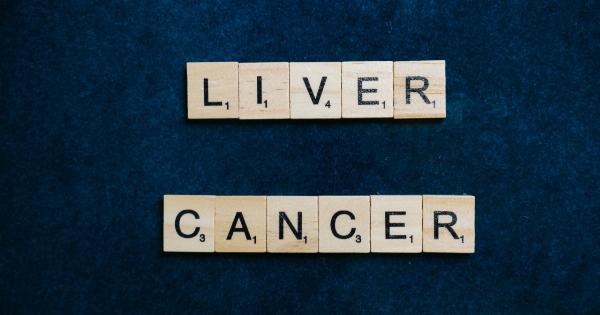Liver cancer is a serious condition that affects millions of individuals worldwide. It is the sixth most common cancer globally and the fourth leading cause of cancer-related deaths.
The liver is a vital organ responsible for various functions, including detoxification, metabolism, and nutrient storage. Therefore, taking steps to reduce your risk of liver cancer is important for maintaining overall health and well-being. In this article, we will discuss several effective methods that can help in reducing the risk of liver cancer.
1. Maintain a Healthy Weight
Excess body weight, particularly obesity, is a significant risk factor for liver cancer. When you carry excess weight, it increases the chances of developing non-alcoholic fatty liver disease (NAFLD), which is strongly associated with liver cancer.
Therefore, it is crucial to maintain a healthy weight through regular exercise and a balanced diet. Aim for at least 150 minutes of moderate-intensity aerobic activity per week to keep your weight in check, reduce fat accumulation in the liver, and lower the risk of liver cancer.
2. Consume a Healthy Diet
Your diet plays a crucial role in maintaining overall health and reducing the risk of various diseases, including liver cancer. Include a variety of fruits, vegetables, whole grains, lean proteins, and healthy fats in your daily meals.
Avoid processed foods, sugar-sweetened beverages, and excessive amounts of red or processed meats, as they can increase your risk of liver cancer. Additionally, limit your alcohol consumption, as excessive alcohol intake is a leading cause of liver cancer.
3. Get Vaccinated against Hepatitis B
Hepatitis B is a leading cause of liver cancer. Getting vaccinated against hepatitis B significantly reduces the risk of acquiring the infection and subsequently developing liver cancer.
The hepatitis B vaccine is safe, effective, and recommended for individuals of all ages, especially newborns, healthcare workers, and those at high risk due to their lifestyle or occupation.
4. Practice Safe Injection Practices
Sharing needles or other drug paraphernalia increases the risk of hepatitis B and hepatitis C infections, which can lead to liver cancer. If you use drugs, it is important to seek help to quit.
If you are unable to quit, ensure safe injection practices, such as using sterile needles and never sharing them with others. Additionally, always ensure proper sterilization of tattoo and piercing equipment to reduce the risk of hepatitis infections.
5. Limit Alcohol Consumption
Excessive alcohol consumption significantly increases the risk of liver cancer. It is vital to moderate your alcohol intake to reduce the risk of developing liver-related diseases, including liver cancer.
The recommended alcohol limits are one standard drink per day for women and two standard drinks per day for men. However, if you have a history of liver disease or other risk factors, it is best to avoid alcohol completely.
6. Avoid Exposure to Toxins
Exposure to certain toxins and chemicals can increase the risk of liver cancer. Limit your exposure to environmental toxins such as aflatoxins, which are naturally occurring compounds produced by molds in peanuts, corn, soybeans, and other grains.
Store food properly, avoid consuming expired or moldy foods, and ensure good ventilation in your living and working spaces to reduce the risk of exposure to harmful toxins.
7. Practice Safe Sex
Hepatitis B and hepatitis C can also be transmitted through sexual contact. To reduce the risk of these infections and subsequent liver cancer, practice safe sex by using barrier methods, such as condoms, with new or multiple partners.
It is also important to get tested regularly for sexually transmitted infections.
8. Regular Hepatitis C Screening
Hepatitis C is a leading cause of liver cancer. Many individuals with hepatitis C infection are unaware of their condition since it often does not cause noticeable symptoms.
Regular screening for hepatitis C is crucial, particularly for individuals with a history of injection drug use or blood transfusions before 1992. Early detection and treatment of hepatitis C can significantly reduce the risk of liver cancer.
9. Exercise Caution with Medications
Certain medications, including anabolic steroids and some non-prescription drugs, can increase the risk of liver cancer. It is important to exercise caution when using medications and follow the prescribed doses.
Avoid the misuse or abuse of medications, as it can have detrimental effects on liver health and increase the risk of liver cancer.
10. Regular Medical Check-ups
Regular medical check-ups and screenings are essential for early detection and prevention of various diseases, including liver cancer. Consult with your healthcare provider regularly, especially if you have underlying liver conditions or risk factors.
They can monitor your liver health, perform necessary screenings, and provide guidance on reducing your risk of liver cancer.
Conclusion
Reducing your risk of liver cancer is within your control by adopting healthy lifestyle habits and practicing preventive measures.
Maintaining a healthy weight, consuming a balanced diet, getting vaccinated against hepatitis B, practicing safe sex, and avoiding exposure to toxins are some of the effective methods to prevent liver cancer. By following these recommendations and staying proactive about your health, you can lower your risk of liver cancer and promote overall well-being.





























